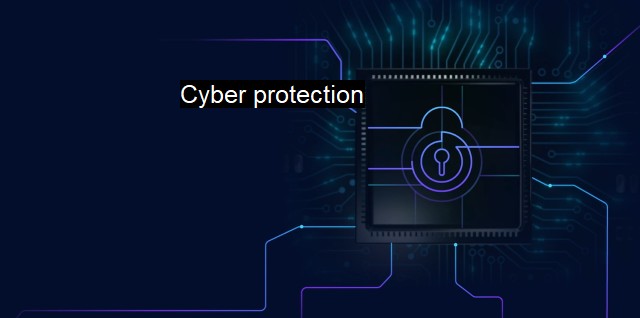What is Cyber protection?
The Importance of Cyber Protection: Safeguarding Your Digital World from Cyber Threats and Attacks
Cyber protection entails the strategies and measures used to protect data, systems, and networks from potential cyber threats. In the modern digital age where the use of technology has become ubiquitous, cyber protection has become an imperative requirement. The proper implementation of cyber protection ensures the reduction of risks associated with cyber threats, hence reducing a business's susceptibility to security breaches.Cyber protection covers everything, from securing accounts with strong passwords to implementing complex cybersecurity systems that protect an entire institution's network. cyber protection can be considered as a defensive shield designed to resist, respond to, and recover from threats that arise from cyberspace, hence protecting both physical and digital infrastructures.
The primary goal is to protect systems, networks, and programs from digital attacks, damage, or unauthorized access. Enterprises typically employ cybersecurity measures to protect against cyber threats such as malware, phishing attacks, ransomware, and social engineering attacks.
Cybersecurity usually includes several layers of protection spread across computers, networks, data, and strategies to protect against various potential threats. It encapsulates lots of methods to prevent, detect, and respond to cyber attacks, aiming to prevent attackers from accessing, changing, or deleting sensitive data, disrupting services, or leading users towards malicious websites. It can call upon many techniques and strategies, such as encryption, firewall protection, intrusion detection systems, antivirus software, and vulnerability management.
Antivirus plays a significant role in cyber protection and acts as the first line of defense against malicious programs. It is designed to detect, thwart, and remove malware — the short form for ‘malicious software’. The spectrum of malware includes damaging programs like viruses, worms, trojans, ransomware, and spyware. In order to detect, fend off, and eliminate these threats, antivirus software employs different strategies.
Signature-based detection is among the universal strategies that involve identifying malware based on a set of recognizable data within the malware, like a sequence of malicious instructions. Heuristic-based detection expands on this technique by attempting to detect new or modified malware types not yet identified by applications. Behavior-based detection works as a crucial tool against harmful programs by identifying them based on how they act on a system instead of their coding signature.
Antivirus requires frequent updates as new risks are discovered continuously. It needs to adapt to evolving cyber threats and implement enhanced strategies for protection against them. Most antivirus software includes a feature allowing automatic updates to ensure optimal efficacy in stopping intruders and threats.
While antivirus software manages to shield against malware, other types of cyber protection are necessary to fend off different types of cyber threats. firewalls protect against unauthorized access to your network, and VPN services help maintain internet privacy by hiding your IP and location.
Cyber protection also includes the creation of backups to recover lost data in the event of a disaster. Cyber protection software often incorporates cloud-based backup services to copy and secure data, providing a safety net in case the original data is damaged or deleted.
Understanding and implementing proper cyber protection measures is paramount in an era where the abundance of valuable information available online creates lucrative targets for cybercriminals. As the ways we use and depend on technology continue to evolve, the mechanisms and practices to protect our digital spaces and infrastructure have to adapt more intelligently and robustly. Cyber protection, thus, remains a constantly dynamic and evolving field, integrating preventive, detective, and counteracting aspects, intent on strengthening cybersecurity environments for residences and corporations alike.

Cyber protection FAQs
What is cyber protection?
Cyber protection refers to the measures taken to safeguard computers, computer networks, and other digital devices from unauthorized access, attacks, theft, and damage. It includes antivirus software, firewalls, and other security solutions designed to prevent cyber threats.Why do I need cyber protection?
You need cyber protection to keep your computer and personal information safe from cyber attacks that can result in identity theft, financial loss, and other serious consequences. Cybercriminals are constantly developing new methods to breach security systems, so it is important to take proactive measures to protect your devices and data.What should I look for in antivirus software?
When choosing antivirus software, look for features such as real-time scanning, automatic updates, and malware removal tools. It is important to choose a reputable brand with a history of effective protection against a variety of cyber threats. Consider additional features such as firewalls, spam filters, and parental controls, depending on your specific needs.What can I do to improve my cyber protection?
To improve your cyber protection, you can take several steps, including updating your devices and software regularly, using strong passwords and two-factor authentication, avoiding suspicious emails and downloads, and backing up your data regularly. Staying informed about current cyber threats and taking proactive measures to protect your devices and data can help keep you safe from cyber attacks.| | A | | | B | | | C | | | D | | | E | | | F | | | G | | | H | | | I | | | J | | | K | | | L | | | M | |
| | N | | | O | | | P | | | Q | | | R | | | S | | | T | | | U | | | V | | | W | | | X | | | Y | | | Z | |
| | 1 | | | 2 | | | 3 | | | 4 | | | 7 | | | 8 | | |||||||